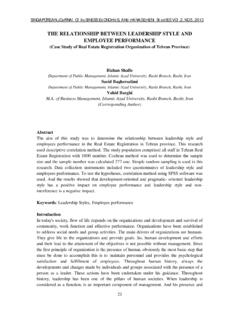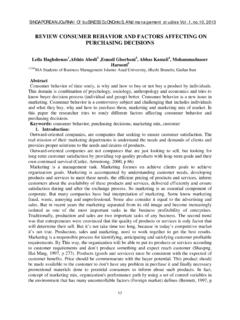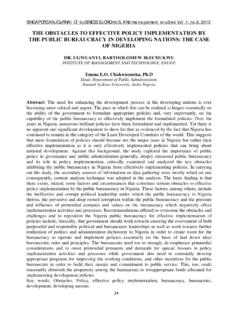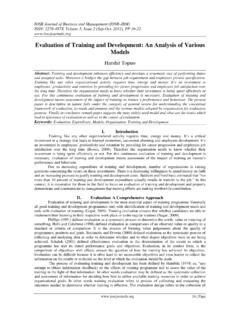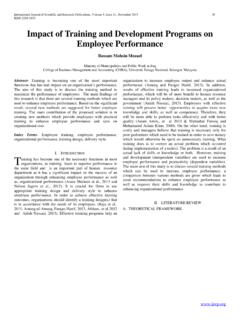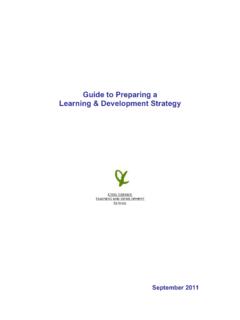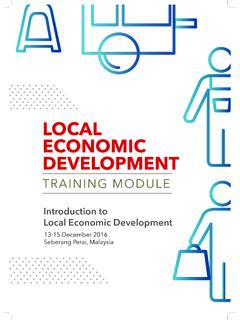Transcription of THE IMPACT OF TRAINING AND DEVELOPMENT ON …
1 , 20143management studies , JOuRNAl Of buSINESS EcONOmIcS, ANd 72 THE IMPACT OF TRAINING AND DEVELOPMENT ON EMPLOYEE PERFORMANCE: A CASE STUDY OF ESCON CONSULTING Franklin Dang Kum Graduate of the Regent Business School, Durban, Republic of South Africa Richard Cowden Academic and Dissertation Supervisor, Regent Business School, Durban, Republic of South Africa Anis Mahomed Karodia (PhD) Professor, Senior Academic and Researcher, Regent Business School, Durban, Republic of South Africa ABSTRACT The study focuses on the IMPACT of TRAINING and DEVELOPMENT on employee performance at ESCON. TRAINING and DEVELOPMENT is a critical process, which seeks to improve the performance of workers in the organisation.
2 In order to form competent committees, employees relevant expertise and intellectual capacity needs to be improved. Some of the projects executed by ESCON fail at an embryonic stage owing to the fact that tenders are awarded to the lowest priced contractor. Moreover, the ineffectiveness of TRAINING and DEVELOPMENT of employees in the organisation reduces the organisation s productivity, as organisations depend on having people with the right skills, attitudes and capabilities in order to reach goals effectively. A random sampling method was used to select participants for this study, which adopted a quantitative approach. Accordingly, data was collected using a questionnaire.
3 The study was limited to employees of ESCON. Subsequently, the findings revealed that working conditions and a lack of resources affect the TRAINING and DEVELOPMENT of employees. It is recommended that certain areas be improved, that is, management support, the provision of feedback to employees and the conducting of employee TRAINING on a continuous basis. The findings show that this would improve employee performance in the organisation. Key Words: TRAINING ; DEVELOPMENT ; IMPACT ; Employee Performance; Organizational Productivity; Ineffectiveness; Critical Process Introduction The South African public sector as well as the private sector is experiencing a significant phase of decline with regard to service delivery.
4 This has seen limited investment in human capital DEVELOPMENT and a notable exodus of available skills, which has added to the acute shortage of skills in the very sectors. Moreover, the sector is lacking in intermediate artisan skills, which could be resolved by a significant investment in human capital and workplace exposure which , 20143management studies , JOuRNAl Of buSINESS EcONOmIcS, ANd 73 can rapidly develop artisan skills in addition to interpersonal and analytical skills. Against this backdrop, ESCON Cc. like most companies in the private sector are affected by weak service delivery, with employees in the organisation not performing their tasks up to expected standards.
5 Background to the study ESCON is a privately owned company that is committed to its mandate of providing efficient, reliable and quality consulting and TRAINING services to both the public and private sector. The company strives to be recognised and to earn respect as a company that delivers high quality unrivalled services to its customers. ESCON therefore considers employees as its most valuable asset, because they share in the responsibility of fulfilling that mission. In terms of the critical skills required by most companies, there is a significant shortage of experienced managers, professional project managers, candidate project managers and qualified artisans in South Africa.
6 This shortage threatens to obstruct service delivery unless improved delivery systems are instituted. These challenges are reflected in the private sector where, for example, the lack of experienced site managers is seen to be undermining service delivery in terms of expected target time, cost and quality requirements. The success of the project management section (PMS) at ESCON relies on the success of the projects being implemented. The PMS has, however, experienced an increasing number of project failures as a result of lack of TRAINING and DEVELOPMENT in terms of the employees who execute projects. The success of any business depends on the quality of its human capital and, while it is recognised that TRAINING plays an important role, there are still concerns as to which kinds of TRAINING and skills acquisition bring economic success.
7 More importantly such TRAINING has to be quantifiable. TRAINING should assist individual performance to IMPACT positively on organisational productivity both in the short term and in the future. Currently, employees in the organisation make many mistakes while performing their tasks. These mistakes can affect the quality of the project offered and consequently the image of the organisation. In the early stages of projects, the poor performance of employees in the project section has led to project failure. This study intends to examine whether there is a link between TRAINING and employee performance in ESCON Pty Ltd. Objectives of the study To investigate factors affecting TRAINING and DEVELOPMENT of employees at ESCON.
8 To determine the IMPACT of TRAINING and DEVELOPMENT on organisational productivity at ESCON. To investigate the IMPACT of TRAINING on employee performance at ESCON. To recommend strategies that can be used to improve the TRAINING and DEVELOPMENT of employees at ESCON. Limitations of the study The study is limited to employees of ESCON in South Africa, who will be given the questionnaires to complete. , 20143management studies , JOuRNAl Of buSINESS EcONOmIcS, ANd 74 LITERATURE REVIEW Reasons for carrying out TRAINING and DEVELOPMENT Employers do not regularly consider the feelings of their employees regarding skills DEVELOPMENT . Accordingly, Frost, Vos and Dreyer (2003:147) claim that the traditional business organisation is closely modelled on the military style of management, probably because armies are the largest and almost certainly the oldest human organisations.
9 In response to this, Katcher and Snyder (2003:90) identify some of the reasons why employers need their employees to continuously learn new skills: Capital improvement. Organisations tend to spend millions of rands on upgrading their plants and equipment, yet little on upgrading their human capital. Employees are an asset to the organisation but employers are more concerned about reaching deadlines and profit maximisation rather than employees skills DEVELOPMENT , without which employee performance could be hampered. Although the organisation still achieves productivity, the focus should also be on the dedication, commitment and loyalty of employees. If employees do not receive ongoing TRAINING , up-to-date equipment will not be used optimally.
10 Morale improvement. Employees who continuously upgrade their job skills will also improve their productivity. Developing employee skills not only plays a role in the workplace, but in the external world as well. It contributes to the full personal DEVELOPMENT of each employee and the socio-economic DEVELOPMENT of the nation at large; therefore, happy employees may be productive, but more productive employees are happier. Ability to adapt to change. The more skilled the workforce is, the easier it will be for the entire organisation to adapt to changes that may arise in the domestic and global market place in the demand of its products and services.

